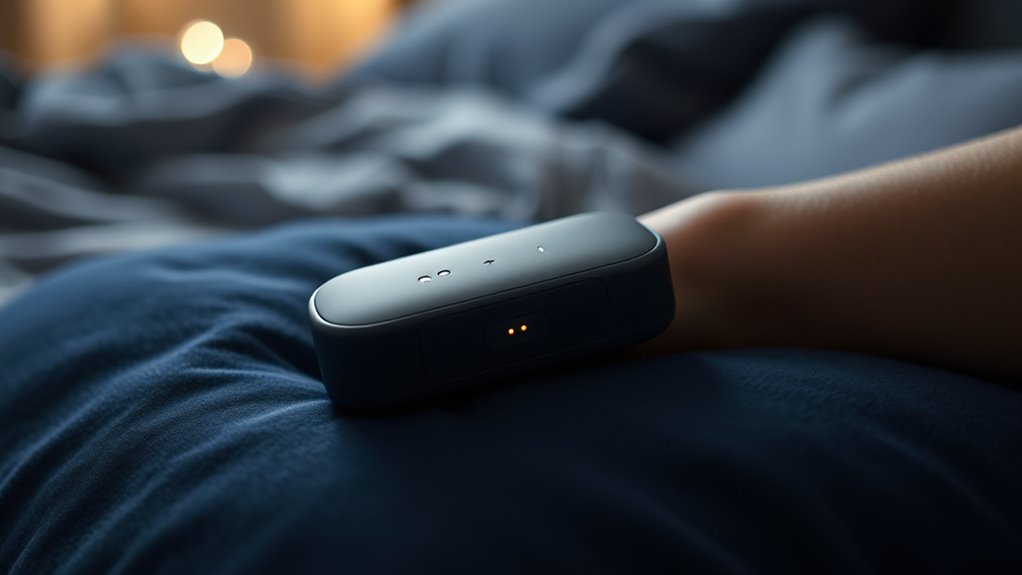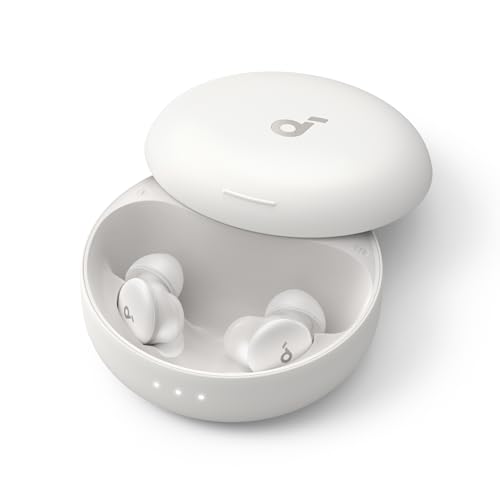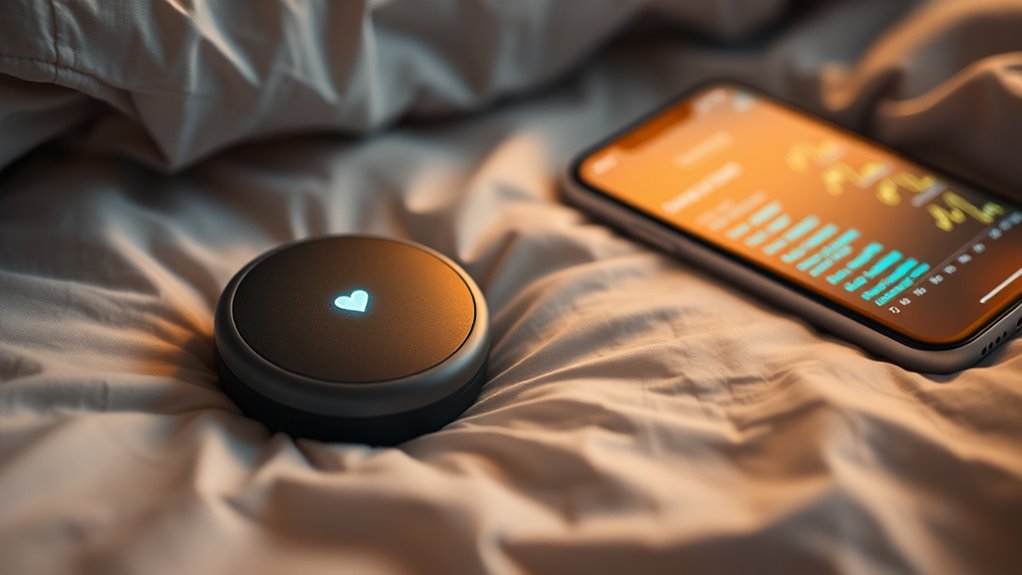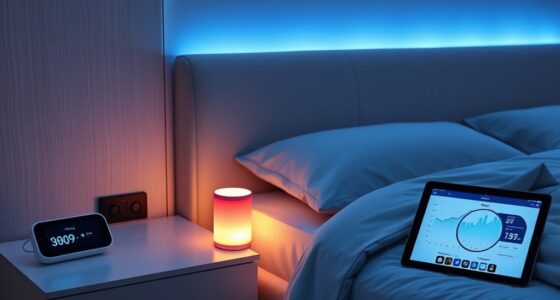Monitoring your heart rate variability (HRV) with sleep devices gives you real-time insights into stress, recovery, and overall health. These devices track fluctuations in your heartbeats overnight, helping you understand how your body responds to daily activities. Lower HRV may signal fatigue or stress, while higher HRV indicates good recovery. By consistently reviewing your data, you can make smarter choices about your health and optimize your routines — discover how to get the most from your device.
Key Takeaways
- Sleep devices continuously track HRV to assess autonomic nervous system balance and overall health.
- HRV monitoring helps identify stress levels, fatigue, and recovery status in real-time.
- Data from sleep devices guides personalized training, rest, and stress management strategies.
- Regular HRV tracking with sleep devices supports mental resilience and athletic performance optimization.
- Advancements in AI enhance the accuracy and interpretation of HRV data for proactive health insights.

Monitoring heart rate variability (HRV) with sleep devices has become an increasingly popular way to gain insights into your overall health and sleep quality. HRV measures the fluctuations in time between your heartbeats, offering a window into your autonomic nervous system’s balance. When you track HRV regularly, you can better understand how your body responds to stress, recovery, and physical exertion. This information is especially useful if you’re looking to optimize stress management and athletic performance. By paying attention to your HRV patterns, you can identify when your body is under strain or ready to perform at a higher level, helping you make smarter decisions about training, rest, and daily activities.
Tracking HRV with sleep devices reveals your body’s stress and recovery signals for smarter health choices.
For stress management, HRV acts as a real-time indicator of your body’s stress levels. When your HRV drops, it often signals increased stress, fatigue, or inadequate recovery. Recognizing these early signs allows you to adjust your routines, incorporate relaxation techniques, or prioritize sleep to bring your HRV back to healthier levels. Over time, you’ll notice a correlation between lifestyle choices and HRV, empowering you to develop habits that reduce stress and promote mental clarity. This proactive approach helps prevent burnout and enhances overall well-being, making HRV a valuable tool for managing the daily ups and downs of life.
In terms of athletic performance, HRV serves as a practical metric for optimizing training schedules. If your HRV is high, it indicates your body is well-recovered and primed for intense workouts. Conversely, a low HRV suggests you might need to scale back to prevent overtraining and injury. By monitoring these changes, you can tailor your training intensity, ensuring you’re pushing yourself enough to improve without risking burnout. Many athletes and fitness enthusiasts use HRV data to fine-tune their routines, making sure each session aligns with their current capacity. This not only boosts performance but also helps you avoid setbacks caused by overexertion.
Incorporating sleep devices that track HRV into your routine offers continuous feedback, making it easier to stay aligned with your health goals. You don’t have to guess how your body is responding; the data provides actionable insights into stress and recovery states. Whether you’re aiming to improve your mental resilience or enhance athletic output, monitoring HRV helps you stay in tune with your body’s needs. Over time, you’ll develop a more nuanced understanding of how lifestyle, sleep quality, and training influence your overall health, giving you the tools to optimize both your physical and mental performance. Additionally, advancements in AI in Business are increasingly enabling better analysis of HRV data to personalize health recommendations.

soundcore Sleep A30 by Anker Sleep Earbuds, Smart Active Noise Cancelling Sleep Headphones, Adaptive Snore-Masking System, Ultra-Comfort for Side Sleepers, 45H Playtime
Block out Sleep Noise with ANC: Smart ANC with Ear Canal Adaptation Tech dynamically adjusts to your ears,...
As an affiliate, we earn on qualifying purchases.
Frequently Asked Questions
How Accurate Are Sleep Device Heart Rate Variability Measurements?
You might wonder how accurate sleep device heart rate variability measurements are. The accuracy depends on proper device calibration and ensuring data consistency. If your device is well-calibrated, it captures more reliable data, giving you a clearer picture of your heart health. Keep in mind that some devices may have limitations, so you should compare their readings with clinical tools for the best insight.
Can HRV Data Predict Future Sleep Quality Issues?
Did you know that low heart rate variability (HRV) often signals stress or fatigue? HRV data can indeed help with sleep quality predictions, as fluctuations may indicate upcoming sleep issues. By tracking your HRV regularly, you can spot patterns that suggest poor sleep is on the horizon, allowing you to adjust habits early. So, yes, monitoring HRV offers valuable insights for predicting future sleep problems and improving overall sleep health.
Do Sleep Devices Track HRV During Naps?
You might wonder if sleep devices track HRV during naps. Many devices now monitor nap durations and can measure HRV if they’re compatible with your wearables or sensors. Check your device’s features to see if it records HRV during naps specifically, as some focus only on overnight sleep. Compatibility varies, so verify your device supports HRV tracking during shorter rest periods for accurate data.
How Does HRV Vary Across Different Sleep Stages?
You might notice that HRV varies across sleep stages, influenced by sleep stage shifts and circadian rhythms. During deep sleep, HRV typically increases, indicating relaxation, while REM sleep often shows decreased HRV due to heightened brain activity. Circadian rhythms also play a role, causing HRV fluctuations throughout the night. Understanding these patterns helps you recognize how your body responds to different sleep phases and overall health.
Are There Any Health Conditions That Affect HRV Readings?
Did you know that certain health conditions can markedly impact your HRV readings? If you have heart conditions like arrhythmias or hypertension, your HRV might be lower or more erratic. Medications, especially beta-blockers or antidepressants, can also influence HRV results. These factors make it essential to interpret HRV carefully, considering your health status and medications, to get an accurate picture of your overall well-being.

TOPOINT Sleep Mask with Headphones Bluetooth 5.4 Wireless, Sleep Headphones Earphones Earbuds with Microphone HD Speakers Music, Blackout Eye Mask for Sleeping Travel Meditation Men Women Cool Gadgets
99.99% LIGHT BLOCK OUT: This bluetooth sleep mask for side sleepers adopt bending cartilage design, adjustable and durable....
As an affiliate, we earn on qualifying purchases.
Conclusion
So, here you are, relying on sleep devices to measure your heart rate variability—thinking they’ve got all the answers. Ironically, while these gadgets promise deep insights, they often miss the subtle nuances of your health. Maybe it’s time to remember that no device can replace genuine medical advice. Still, it’s amusing how we trust technology to decode our bodies’ secrets, yet often overlook the simple, human touch that truly matters.
Amazon Product B0G1Y4VWQP
As an affiliate, we earn on qualifying purchases.
Amazon Product B0FWQLTNSF
As an affiliate, we earn on qualifying purchases.









